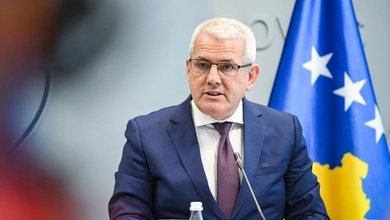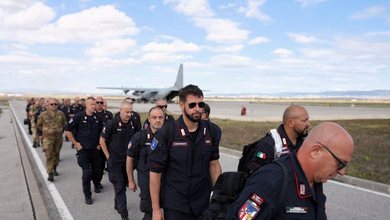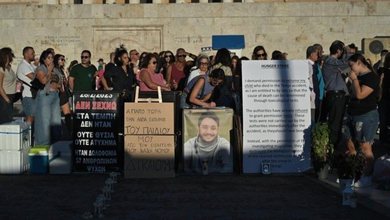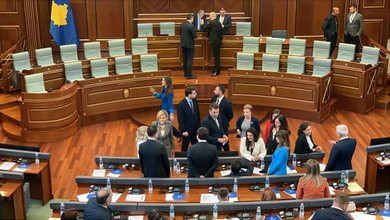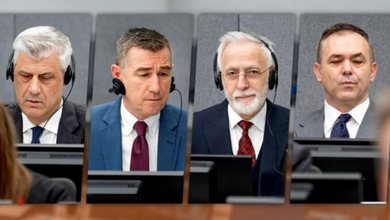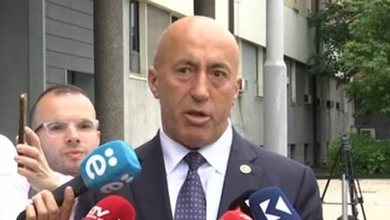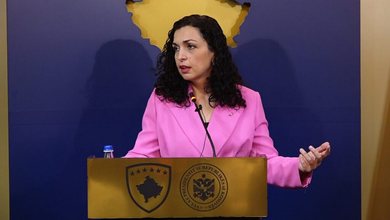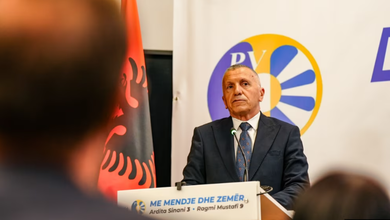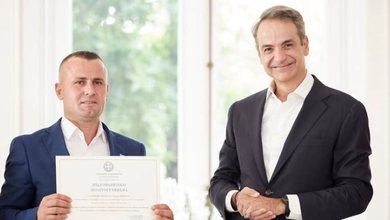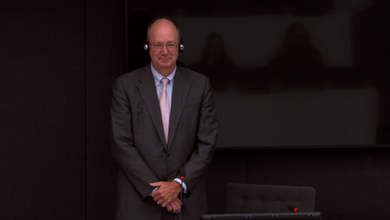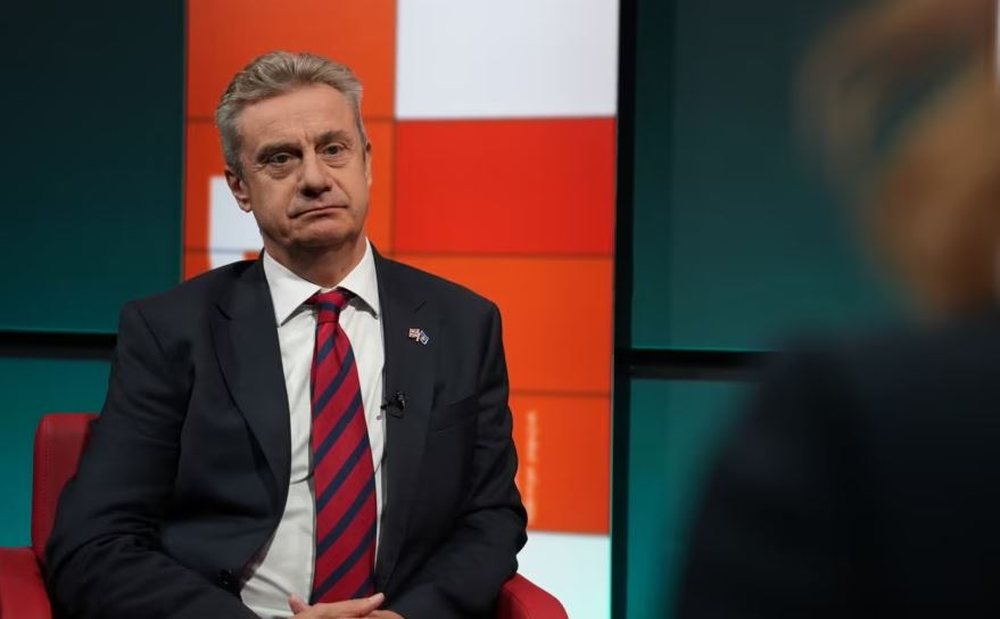
The British Ambassador to Kosovo, Jonathan Hargreaves, in an interview with Radio Free Europe warns that the protracted political stalemate is costing the country a "full and credible voice" in the international arena and is blocking vital priorities - from the budget to reforms.
He urges all parties to allow the Constitutional Court to do its job, to unequivocally respect its decisions, and to enable the functioning of the Assembly, the election of the government, and the president in early spring.
According to him, the responsibility for a solution is shared – legal and political – adding that if this is not achieved, then new elections remain an option, but on the condition that the local elections are first conducted well and the results are respected.
By September 30, the Constitutional Court is expected to issue a new decision regarding the process of constituting the Kosovo Assembly, following the complaint of the Serbian List regarding the division of the voting for deputy chairmen among the communities.
Hargreaves also says it is "disappointing and worrying" that the dialogue with Serbia is progressing slowly due to the lack of institutions in Kosovo and political developments in Serbia.
Commenting on the condition set by Kosovo's acting Prime Minister Albin Kurti for the continuation of the dialogue – the extradition of Milan Radoić – Hargreaves says it is essential that Radoić and the other perpetrators of the Banjska attack are brought to justice as soon as possible, as impunity for this attack "cannot continue".
The British diplomat also spoke about the issue of integrating Serbian education and health institutions, saying that their integration is "extremely sensitive," emphasizing that the solution must be found within the legal framework of Kosovo, through the establishment of the Association of Serb-majority Municipalities.
Radio Free Europe: Every day now we expect another decision from the Constitutional Court, regarding the constitution of the Assembly and the issue of electing deputy speakers from communities. What are your expectations?
Jonathan Hargreaves: Thank you very much for the invitation! Before I move on to this topic, I want to emphasize that this week marks the second anniversary of the terrible attack in Banjska. I want to express my condolences to the family of [slain police officer, Afrim] Bunjaku and also to assure you that we continue to insist that the perpetrators of this attack are tracked down and brought to justice.
As for the Constitutional Court, yes, we are all eagerly awaiting the decision next week, and I hope that the Court will be able to deliver it on time.
Of course, I don't know what it will be, and I don't think any of us know for sure.
I think the most important thing is for all parties involved to take it very seriously, to publicly declare that they will implement whatever the Court suggests or orders, and, above all, to act to implement it.
We have been in this situation – without an Assembly and without a full government – for a very long time in the interest of Kosovo. And, I think, it is really urgent now. It has been urgent for a long time for the Assembly to be properly formed and for there to be a functional government.
I think Kosovo is losing out during this period, by not having a full and credible international voice.
As I understand it, almost a billion euros in grants and loans are blocked in the Assembly. There are also many laws that need to be passed. So, the people of Kosovo are losing out due to the lack of a full assembly and government.
Language concerns towards the Constitutional Court
Radio Free Europe: But why does the United Kingdom feel the need to emphasize respect for the Court's rulings? Is there any concern that some will not respect them?
Jonathan Hargreaves: Of course, it is an essential part of the Constitution of Kosovo and an essential part of the implementation of the rule of law, where Kosovo has made a lot of progress over the last period. And it is something that Kosovo should be very proud of. Since independence, there has been great progress in the strong implementation of the rule of law.
We are concerned, like others, about some of the words that have been said about the Constitutional Court and the consequences they could have on whether the Court could do its job properly and whether its decisions would be fully respected.
Therefore, I very much hope and expect that all political parties and all of society will allow the Court to work and, most importantly, implement the decisions it makes.
Radio Free Europe: Are you referring to the language used by the winning party of the incumbent Prime Minister, Albin Kurti?
Jonathan Hargreaves: I think it's very important that all parties make it clear that, regardless of political beliefs, they are on the same page when it comes to the Constitutional Court – to let it do its job and respect its decisions.
The possibility of new elections to resolve the political impasse in Kosovo
Radio Free Europe/Radio Liberty: What risks do you see if this stalemate continues?
Jonathan Hargreaves: I think there are a lot of risks. One is timing. We really need the Assembly to be functional and able to elect a new president by early spring.
Kosovo definitely needs an approved budget. It needs to be active on the international stage. We have been working with Kosovo for many years, not only here, but also internationally.
We want to see Kosovo part of more international organizations. We want to see it as a partner in European security. We want to see the Government of Kosovo do things that really matter to all the people who live in Kosovo.
And all of this is blocked now. I don't think this is in the interest of Kosovo.
Radio Free Europe: But we have also heard the option of holding another election cycle. Can Kosovo afford that?
Jonathan Hargreaves: If they are needed and if the parties conclude that they are necessary to move the situation forward, then let them be held. First of all, I think it is very important that the local elections go well. We are working very hard with the [Central] Election Commission and others to make sure that the local elections are properly organized. And I hope that they will be. I really hope that many citizens across the country will participate. I really hope that the results will be respected and implemented. I think that is the first step.
If there is a need for new national elections later, because they are the only way for Kosovo to get out of the current impasse, then let them be held.
I am confident that all parties and institutions would organize them at least as well as the elections last February.
Radio Free Europe: Where do you see the main responsibility when it comes to resolving this impasse?
Jonathan Hargreaves: I think it's across all political parties. Of course there are legal and institutional issues, and that's the job of the Constitutional Court. But there needs to be a combination of legal and political approaches.
I don't think we will go beyond this if the parties don't do what the cosmopolitan system was built for – for people and parties to work together, find political solutions in the interest of the country, while respecting and implementing the Constitution.
Therefore, I am calling on all political parties to find together whatever solution they can.
I don't know what the best combination is, but I believe that, in addition to following legal procedures, a lot of work, a lot of political courage is needed from the leaders of this country.
I know it is not easy and that the situation is difficult for each of them, but precisely this political courage to make compromises and work together for the country's interest is what we need.
“Language concerns towards the Constitutional Court”
Radio Free Europe: You mentioned earlier the language being used. The criticism of the Constitutional Court is precisely what prompted the United States to suspend the planned Strategic Dialogue with Kosovo. The EU measures against Kosovo, imposed two years ago, are still in force. What is the current partnership or relationship between the United Kingdom and Kosovo?
Jonathan Hargreaves: I have been in this country for 18 months. I am extremely privileged to be here, in this role, as British Ambassador. The first thing that has struck me, in almost every meeting I have had during my time here, is the depth and warmth of the relationship between Kosovo and the United Kingdom, which, as you know, dates back to 1999, when British troops were among the first to come as part of the NATO operation. In 2008, the United Kingdom was the first country to recognise Kosovo's independence. We have cooperated long and deeply on security, and we believe that Kosovo should be and is an independent and sovereign country. So I think the relationship between the United Kingdom and Kosovo is very strong, and we are very proud of that and we continue to be, and we will continue to be.
We have some concerns, which we share with other international partners. I mentioned some of these concerns about language to the Constitutional Court. We have said them publicly. I have said publicly that I am concerned about some of the actions that have been taken, particularly in northern Kosovo over the last few months, which have not been done in proper consultation with the affected communities, and which have fueled fear and instability in these communities.
I am concerned when I hear people questioning the foundation of this state, which, from our perspective, is based on the Ahtisaari Plan, as reflected in the Declaration of Independence and the Constitution; which forms the fundamental bond between our countries, because it is precisely on this foundation that we based our essential assistance in Kosovo gaining recognition from over 100 countries.
Radio Free Europe: Do you think Kosovo is not relying on it enough?
Jonathan Hargreaves: I worry when I hear people opening up that discussion, because I think it's very important that Kosovo continues to build on that foundation that brought recognition to the state. In particular, it's very important to protect non-majority communities, which was at the core of all three documents that I mentioned. We have some... We would like to see a more active implementation of those principles, of real protection of the rights of non-majority communities, a really active language and actions, that ensures that all non-majority communities that live in this country feel really protected, feel like they have a future here, feel like they are part of this country.
Radio Free Europe/Radio Liberty: I believe you conveyed these messages to the acting Prime Minister, Kurti, during your meetings. Do you see readiness?
Jonathan Hargreaves: I think people have heard me say these things often in public and, of course, I say them in private. I was encouraged by what the Prime Minister said in his video message to the Serbian community about a week ago, where he talked about his commitment to the Kosovo Serb community, in particular his commitment to working with the new Kosovo Serb mayors, if and when they are elected, particularly in the four northern municipalities.
He talked about genuine discussions with them about some of the decisions that could affect their lives. So what I heard was really encouraging. What we would like to see now and in the months and years to come are actions, beyond words, that really demonstrate that he and the government mean it. And for Kosovo Serbs and other non-majority communities to feel that this is a place where they have a future, they have the same rights to services and protection as everyone else.
Radio Free Europe/Radio Liberty: Do you believe this should be among the priorities of the next government? And what other priorities do you think the next government should have?
Jonathan Hargreaves: I certainly think that's one of the really important things, and one that we, as an international community, focus on a lot, for the reason that I mentioned, that it was so fundamental to the foundation of our relationship. But, of course, now, I'm happy to say, I've visited almost every municipality in Kosovo. I've only got a few left that I need to visit. In my visits to these municipalities, I've talked to the mayors and to the residents. Of course, I hear a lot of other things that are on their minds. I hear people's concerns about water and waste management.
Radio Free Europe: We hear these things even during the election campaign...
Jonathan Hargreaves: Exactly. I hear people talking about the quality of education. And I hear young people, like last week at one of the Berlin Process events here, talking about what makes them stay and work and be productive in this country, rather than feeling like they could have a better life somewhere else. I often talk to women's groups who are concerned about gender-based violence. There are a lot of things in this country that any new government needs to address, in addition to some of the fundamental things that, as I say, form the foundation of this country.
Dialogue with Serbia
Radio Free Europe: What about the dialogue with Serbia? The circumstances, both in Serbia and in Kosovo, do not seem favorable for continuing this process. How can this process move forward, from your point of view?
Jonathan Hargreaves: It's no secret that it's not moving very quickly at the moment. And that's not surprising, given the lack of an Assembly and a fully-fledged government here. We also understand that there are many developments in Serbia at the moment that are receiving a lot of political attention.
So it is disappointing and worrying that the dialogue is not moving forward at the moment. But the EU has an excellent Special Representative, and an excellent team, who I know are working hard to prepare the ground for when a better opportunity presents itself to move forward. The UK is certainly committed to supporting the EU in that process. And, in the meantime, it is ensuring that the conditions in Kosovo are as good as possible, to enable a good environment for that. That is something that Kosovo can do, whether it is bilateral or trilateral talks. But the basis of the dialogue will be very much influenced by the conditions on the ground. And that is something that I think is within the control of Kosovo and its government.
Should the extradition of Milan Radoić be a condition for continuing the dialogue?
Radio Free Europe: But there is another condition that Prime Minister Kurti has set for the continuation of the dialogue, and that is the extradition of Milan Radoić, who claimed responsibility for the armed attack in Banjska. Do you consider this request legitimate?
Jonathan Hargreaves: I think it is very important that Milan Radoićić and the other perpetrators of the attack in Banjska are brought to justice as soon as possible.
Radio Free Europe: Where?
Jonathan Hargreaves: I think it is a matter for the Serbian authorities first, and we are, consistently and regularly, talking to the Serbian authorities about this. I don't want to go into what happens next, because I think, first and foremost, it is a matter for the Serbian judicial system to deal with this. But it is really important that this happens. We cannot continue with impunity for that terrible attack, and there must be action against Mr. Radoićić and his colleagues.
Radio Free Europe: So, you're saying that the prime minister should adhere to that condition?
Jonathan Hargreaves: I wasn't referring to whether or not it should be a condition for dialogue. I think it's a process that needs to happen. Also, I think the sooner Kosovo and Serbia get back on track, with a constructive dialogue between them, the better it will be for the people of Kosovo.
"Health and education, only in accordance with the establishment of the Association"
Radio Free Europe/Radio Liberty: There is also an ongoing discussion now, and you mentioned the prime minister's message to the Serb community last week about the integration of the health and education systems. The leader of the Serbian List, Zlatan Ellek, said that this is, in a way, a red line for them. How do you see this process? Are you involved in discussions with the Kosovo Government about this?
Jonathan Hargreaves: It's a very sensitive topic and, of course, every family will think very seriously about the quality of education and healthcare, where it's going to come from, how it's going to continue, how it's going to be funded, how their children are going to continue to have access to it. So it's extremely... Those two issues are extremely sensitive and, at the same time, they're big issues for people across Kosovo and they matter to families across the country.
Those [services] are currently provided by Serbian structures. And we have always held the position that the primary way in which they should be governed and regulated, under the legal framework of Kosovo, would be through the agreed mechanism of an association of Serb-majority municipalities. And we still believe that this is the ultimate goal, to reach an agreement, to form and implement an association, which oversees those services.
Radio Free Europe: Do you agree that these services should be selected within the Association, as foreseen in the draft statute presented to Prime Minister Kurti?
Jonathan Hargreaves: I think the Association should be the final point, and any work on health and education should be consistent with the establishment of an association. I think the other really important point is, and perhaps an even more important point is, as I said, these are services that directly affect families and individuals. And, any policymaker, anywhere in the world, I think would agree that to have real consultation, real involvement of the communities that are going to be affected by the changes, in the way that such important issues are communicated to them, that needs to be a real conversation.
As I said, I was very pleased to hear the Prime Minister say that he would be willing to discuss such issues with the new mayors. But I also think that there are different channels through which it is really necessary for the Kosovo authorities to have real, personal and direct communication with the communities that are affected, and to find a way so that, whatever happens to those services, they remain accessible, of high quality and affordable.
And, as I said, this should happen within the framework of the EU-led dialogue, because this is a long-term commitment of Kosovo. But also, and most importantly, I think, [in consultation] with the communities that will be affected by them.
Radio Free Europe: But, after what has happened over the last two years in the north, it seems like dialogue, communication, has never been further away between local Serbs and the official authorities in Pristina. As I said, the leader of the Serbian List has already declared that those are the red lines. What would be the way for the Kosovo Government to approach these people, perhaps restore their trust, and open a discussion on this issue?
Jonathan Hargreaves: Sigurisht nuk pretendoj se është e lehtë, dhe ne, në Mbretërinë e Bashkuar, kemi njëfarë përvoje me komunitete që, për një kohë të gjatë, nuk i kanë besuar njëri-tjetrit. Po i referohem, natyrisht, situatës në Irlandën e Veriut. Me kalimin e kohës janë gjetur mënyra që këto komunitete të krijonin forma më të mira dialogu.
Mendoj se një pjesë e rëndësishme është përdorimi i mekanizmave të ndryshëm për biseda të sinqerta – qoftë përmes përfaqësuesve politikë, por edhe përmes shoqërisë civile dhe përfaqësuesve të tjerë autentikë të komuniteteve. Por, ndoshta edhe më e rëndësishme është se Kosova, siç më thuhet shpesh dhe me të cilën pajtohem, ka një kornizë shumë të mirë ligjore për mbrojtjen e të drejtave të komuniteteve joshumicë. Korniza ekziston, por ajo që nuk ndodh gjithmonë është zbatimi i saj në mënyra të qarta, të arritshme dhe të qëndrueshme.
Ekzistojnë institucione dhe mekanizma shumë të dobishëm që mund të ndihmojnë në këtë drejtim – për shembull, Inspektorati i Policisë, një organizatë e mirë, por që duhet të jetë edhe më e qasshme dhe të tregojë reagim ndaj ankesave që i drejtohen. Roli i Avokatit të Popullit është, po ashtu, jashtëzakonisht i rëndësishëm. Ekziston edhe Zyra për Çështje të Komuniteteve, pranë Zyrës së Kryeministrit, e cila duhet të merret me çështjet e gjuhës, Zyra e Komisionarit për Gjuhët, dhe shumë të tjera.
Këto struktura ekzistojnë, por, shpeshherë, ka vende të paplotësuara, mungesë fondesh ose pengesa që komunitetet të kenë qasje në to, apo të dinë saktësisht si funksionojnë. Prandaj, mendoj se ka shumë hapa praktikë që mund të ndërmerren, përtej fjalëve dhe deklaratave të mira për qëllime, dhe që realisht do të tregonin se autoritetet e Kosovës duan t’ua bëjnë më të lehtë serbëve të Kosovës të ndihen pjesë e këtij shoqërimi.
Radio Evropa e Lirë: Do të ndalem edhe pak te dialogu. Duket sikur dialogu me Serbinë po e pengon përparimin e Kosovës drejt njohjeve të reja dhe anëtarësimeve në organizata të ndryshme, si Këshilli i Evropës, apo edhe NATO. Nëse Serbia vazhdon të mos bashkëpunojë – është pak hipotetike kjo – por nëse Serbia vazhdon të mos bashkëpunojë, a ka një pikë kur bashkësia ndërkombëtare do të thotë “mjaft me vonesa për Kosovën, le ta ndihmojmë të ecë përpara”?
Jonathan Hargreaves: Serbia dhe Kosova kanë bërë zotime në pika të ndryshme gjatë këtij procesi të dialogut, siç mund ta quaj, ndër vite, dhe ne do të donim të shihnim që të dyja palët – Serbia dhe Kosova – t’i zbatojnë plotësisht këto zotime. Kjo do të thotë që, sigurisht, Serbia ka përgjegjësi për gjërat për të cilat është zotuar, por edhe Kosova duhet të ecë përpara me gjërat për të cilat është zotuar vetë. Mendoj se kjo është mënyra më e mirë që Kosova të bëjë më shumë përparim drejt institucioneve ku ne, në fakt, duam ta shohim.
Ne duam që Kosova të jetë pjesë e NATO-s. Ne duam që Kosova të jetë pjesë e Bashkimit Evropian. Ne duam që Kosova të jetë pjesë e Këshillit të Evropës. Shpesh, ne e mbrojmë rastin e Kosovës. Por, është më e vështirë kur ka vende që shohin çfarë po ndodh, dhe shohin disa zotime që ende nuk janë përmbushur. Është më e vështirë për ne t’i bindim të tjerët që Kosova duhet të bëhet pjesë e klubeve ku ata janë anëtarë, nëse nuk i përmbush zotimet që vetë i ka marrë përsipër.
Ajo që më duket se shqetëson shumë njerëz në këtë vend – dhe që, siç e përmenda në fillim të këtij diskutimi, është thelbësore për marrëdhëniet tona – është siguria e njerëzve të Kosovës. Dhe, sipas meje, mënyra më e mirë që njerëzit e këtij vendi të ndihen të sigurt është që Kosova të jetë anëtare e atyre organizatave ndërkombëtare që garantojnë këtë siguri.
Do të doja, siç thashë, ta shihja Kosovën duke bërë më shumë përparim drejt NATO-s. Do të doja ta shihja Kosovën duke luajtur rol edhe më të madh në atë që nganjëherë e quajmë eksportim të sigurisë. Kosova ka kapacitet dhe aftësi të jashtëzakonshme, për të cilat ne punojmë së bashku, për shembull në operacionin Interflex, ku Forcat e Sigurisë së Kosovës kanë ndihmuar në stërvitjen e ukrainasve.
Prandaj, mendoj se është në interesin e Kosovës të bëjë gjëra që na mundësojnë të ndihmojmë Kosovën të bëhet pjesë e këtyre organizatave ndërkombëtare. Por, Kosova, gjithashtu, duhet të jetë në gjendje t’i bindë anëtarët ekzistues të këtyre organizatave se mund të jetë pjesë e tyre.
Gjendja e sigurisë në Kosovë: E qetë, por e brishtë
Radio Evropa e Lirë: Meqë përmendët sigurinë, Mbretëria e Bashkuar, në njëfarë mënyre, kishte shprehur shqetësime para ngjarjes në Banjskë. E di që ambasadori i mëparshëm, në një intervistë, pati thënë se ishte i shqetësuar për atë që mund të ndodhte në javët në vijim – dhe më pas ndodhi Banjska. Si do ta përshkruanit gjendjen aktuale të sigurisë në Kosovë?
Jonathan Hargreaves: Mendoj se, për momentin, në pamje të jashtme është e qetë, dhe shpresoj që kështu të vazhdojë. Por, mendoj se ekziston një brishtësi për të cilën duhet të jemi shumë të vetëdijshëm. Banjska dhe incidente të tjera treguan se gjithmonë ekziston një cenueshmëri ndaj ngjarjeve të tilla – sidomos kur ka arsye që komunitetet të mos i besojnë njëri-tjetrit, ose kur ndodhin situata që tregojnë përpjekje për të minuar institucionet.
Pra, në përgjithësi është e qetë, por e brishtë. Dhe, le të punojmë së bashku që kjo brishtësi të jetë e menaxhueshme, dhe ta zhvendosim drejt një drejtimi tjetër – drejt më shumë stabiliteti për të gjithë, sepse mendoj se kjo është në interesin e të gjithëve.
Ne, sigurisht, kemi trupa këtu, si pjesë e KFOR-it. Aktualisht, kemi 350 trupa që janë pjesë e rezervës strategjike. Kjo situatë, pra, prek jo vetëm Kosovën, por edhe Mbretërinë e Bashkuar. Prandaj, ne vazhdojmë t’i bëjmë thirrje Kosovës të sigurojë që situata të mbetet jo vetëm e qetë, por edhe të fitojë qëndrueshmëri më të thellë.
Radio Evropa e Lirë: Drejtori i Policisë së Kosovës, Gazmend Hoxha, ka thënë se janë regjistruar fluturime dronësh, që dyshohet se po vijnë nga territori i Serbisë në pjesën veriore të Kosovës, dhe se Policia është në kontakt me KFOR-in dhe me partnerët. A dini diçka për këtë?
Jonathan Hargreaves: Jo, nuk i di hollësitë për këtë çështje. Jam shumë i bindur se drejtori Hoxha dhe KFOR-i do të vazhdojnë komunikimin shumë të mirë që e di se e kanë mes vete, për të kuptuar saktësisht çfarë po ndodh dhe çfarë duhet bërë në këtë drejtim.
Procesi i Berlinit
Radio Evropa e Lirë: Situata e sigurisë më çon edhe te Procesi i Berlinit. Migracioni, siguria dhe rritja ekonomike janë prioritetet e këtij samiti, i cili do të mbahet në tetor në Mbretërinë e Bashkuar, në Londër. Përtej deklaratave, çfarë rezultate konkrete mund të presin Kosova dhe rajoni nga ky samit?
Jonathan Hargreaves: Jemi të kënaqur që këtë vit jemi mikpritës të Procesit të Berlinit. Siç përmendët, do të ketë një takim të liderëve më 22 tetor, në Londër. Para këtij takimi, ministrat e Jashtëm do të mblidhen në Irlandën e Veriut, ndërsa ministrat e Brendshëm dhe ata të Ekonomisë do të takohen, po ashtu, në Londër.
Ka një arsye pse quhet Procesi i Berlinit – sepse është një përpjekje e vazhdueshme, të cilën miqtë tanë shumë të mirë në Gjermani e kanë udhëhequr përgjatë dekadës së fundit, për të gjetur mënyra të shumta që qeveritë, shoqëria civile dhe bizneset nga gjashtë vendet e Ballkanit Perëndimor të vazhdojnë të komunikojnë për çështje me të vërtetë të rëndësishme.
Këtë herë, besoj se kemi rreth 16 takime të ndryshme në rajon. Ne kemi dashur të sigurohemi që një pjesë e këtyre takimeve të zhvillohen brenda rajonit, dhe të udhëhiqen nga vendet e rajonit, për të mbajtur hapur kanalet e komunikimit dhe për të forcuar bashkëpunimin praktik mes pjesëve të ndryshme të shoqërisë në Ballkanin Perëndimor.
Ka, sigurisht, disa gjëra konkrete që shpresojmë të dalin prej këtij procesi. Jemi shumë të kënaqur që vitet e fundit kemi punuar me Kosovën dhe Shqipërinë, dhe së fundi edhe me Maqedoninë e Veriut, për një grup të përbashkët pune për migracionin, i cili na ndihmon të bashkëpunojmë në këtë fushë. Shpresojmë që Procesi i Berlinit të krijojë hapësirë për ta shtrirë këtë bashkëpunim edhe me vende të tjera të rajonit.
Po ashtu, ky proces do të përdoret për të shtyrë përpara zbatimin e disa aspekteve të CEFTA-s, si dhe për çështje praktike që lidhen me teknologjinë, roaming-un dhe shumë tema të tjera, duke përfshirë edhe njohjet.
Radio Evropa e Lirë: Për shembull, për dokumentet mes Kosovës dhe Bosnjës.
Jonathan Hargreaves: This is one of the elements that we are working hard on – the recognition of ID cards and also the mutual recognition of university degrees – which we hope will be part of the solution. We are very happy to be hosting the process this year. Our Prime Minister was extremely keen for us to do this because it represents the importance that the UK attaches to this region, and its role in stability across Europe – which, in a much wider sense, is on the minds of all European leaders today.
So this is a very important part of the wider European security and stability mosaic. The six Western Balkan countries have a really important role to play in this regard, and that is why the United Kingdom is interested in facilitating this process, through practical ways, this year.
Radio Free Europe/Radio Liberty: How would you respond to some experts who have told us that the Balkans are in the "new 90s"? Are you worried? Do you see it that way too, or...
Jonathan Hargreaves: I think the kind of cooperation that we're seeing during this process shows that it's not always easy. It shows that memories are hard to overcome, and it shows that there are things that countries don't completely agree on.
But the importance of this process lies precisely in the fact that it is a space for so many different issues, which enables better communication, better cooperation and, above all, practical benefits from this cooperation between the Western Balkan countries. And, I think, this is the best way to ensure that we move forward, not backward./REL


